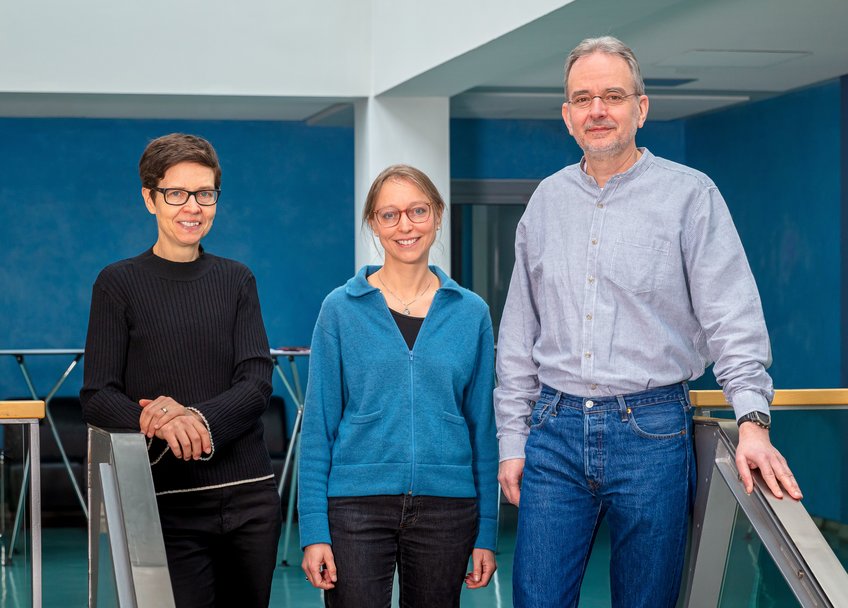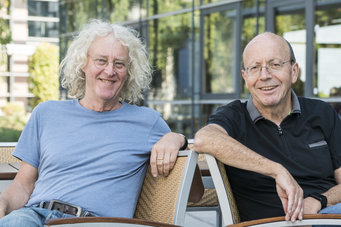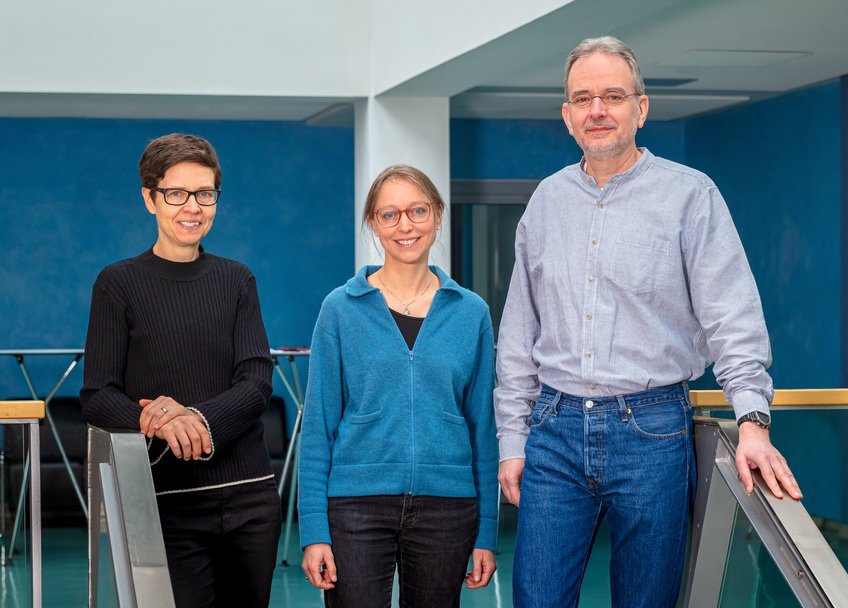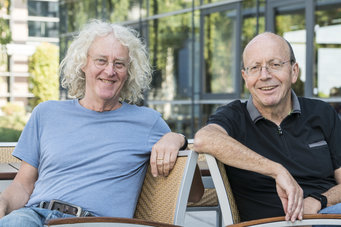Germany
May 4, 2023
Das Max-Planck-Institut für Molekulare Pflanzenphysiologie (MPI-MP) freut sich, bekannt geben zu können, dass seit Februar 2023 das Leitungsteam am MPI-MP wieder vollständig ist. Mit den Berufungen von Prof. Dr. Claudia Köhler und Prof. Dr. Caroline Gutjahr ist es dem Institut gelungen zwei hervorragende Wissenschaftlerinnen zu verpflichten, die gemeinsam mit Prof. Dr. Ralph Bock exzellente Pflanzenforschung betreiben werden.
Forschung zu spannender Lebensgemeinschaft am MPI-MP neu etabliert
Die frisch ans Institut berufene Direktorin Prof. Dr. Caroline Gutjahr widmet sich in ihrer neu etablierten Abteilung „Wurzelbiologie und Symbiose“ dem höchstspannenden Thema einer als Mykorrhiza bezeichneten Lebensgemeinschaft zwischen bestimmten Bodenpilzen und Pflanzenwurzeln, die für beide Seiten von Vorteil ist.
Pilze sind im Unterschied zu Pflanzen nicht in der Lage Fotosynthese zu betreiben. Sie müssen sich deshalb auf andere Weise mit organischen Stoffen versorgen. Die Mykorrhiza Pilze durchziehen mit einem riesigen Hyphengeflecht den Boden. Bei den Hyphen handelt es sich um fadenförmige Zellen des Pilzes. Vorstellen kann man sich dieses Pilzgeflecht wie ein weitverzweigtes Spinnennetz im Boden. Die Hyphen dienen dem Pilz zur Nährstoff- und Wasseraufnahme.
Die Mykorrhiza Pilze gehen mit Pflanzen eine Symbiose ein, indem die Hyphen in die Pflanzenwurzeln eindringen. An den verzweigten Pilzhyphen innerhalb der Pflanzenwurzel findet der Nährstoffaustausch statt. Diese bäumchenförmigen Strukturen geben der Symbiose auch ihren Namen: abgeleitet von lateinisch Arbuscula für Bäumchen nennt man sie arbuskuläre Mykorrhiza. In dieser Lebensgemeinschaft liefern die arbuskulären Mykorrhiza Pilze den Pflanzen wichtige Nährstoffe wie Phosphat und Ammonium und machen Wasser für die Pflanze leichter verfügbar. Im Gegenzug erhalten die Pilze von den Pflanzen Kohlenhydrate und Fettsäuren.
Lange Zeit dachte man, dass die Pilze nur Kohlenhydrate von der Pflanze bekommen. In Wahrheit besteht der größte Anteil, der von den Pflanzen gelieferten Stoffe allerdings aus Fettsäuren. Frau Gutjahr konnte bereits im Jahr 2017 gemeinsam mit ihren Mitarbeiterinnen und Mitarbeitern und in Zusammenarbeit mit weiteren Arbeitsgruppen diese gängige Lehrmeinung widerlegen, weshalb die Lehrbücher eigentlich dementsprechend umgeschrieben werden müssten.
Frau Gutjahr ist seit ihrer Berufung im April 2022 zwischen ihren Verpflichtungen an ihrer bisherigen Wirkungsstätte an der Technischen Universität in München und dem MPI-MP gependelt. Sie hat bereits begonnen ihre Abteilung aufzubauen und freut sich nun sehr darauf, an ihrem neuen Standort zu forschen. Zu ihrem Forschungsbereich erläutert Frau Gutjahr: „Ich beschäftige mich mit den molekularen Mechanismen, die für das Zustandekommen und Funktionieren dieser für Pflanzen und Pilze gleichermaßen vorteilhaften Zusammenarbeit notwendig sind und auch wie und durch welche Faktoren die Etablierung der Pilz-Pflanze Symbiose beeinflusst wird.“ Besonders spannend findet Frau Gutjahr ihren Fokus nicht nur im Bereich der Grundlagenforschung setzen zu können, sondern dass auch möglicherweise Mykorrhiza optimierte Nutzpflanzen gezüchtet werden können, mit denen sie einen Beitrag zu einer nachhaltigeren Landwirtschaft leisten könnte.
Vererbung ist mehr als die Summe aller Gene
Bei der zweiten Abteilung mit Namen „Reproduktionsbiologie und Epigenetik“, die auch erst im Jahr 2021 mit der Berufung von Prof. Dr. Claudia Köhler etabliert wurde, liegt der Forschungsfokus auf den Änderungen von Genaktivitäten, die nicht auf einer Veränderung der DNA-Sequenzen beruhen, sondern durch andere Mechanismen ausgelöst werden. Grundlage dafür sind oftmals chemische Veränderungen an den Grundbausteinen der Erbsubstanz oder von Proteinen, die an die DNA binden. Viele zelluläre Regulations- und Differenzierungsprozesse werden durch solch epigenetische Mechanismen gesteuert. Frau Köhler beschäftigt sich in ihrer Abteilung mit epigenetischen Prozessen, die die Samenbildung bei Blütenpflanzen regulieren. Obwohl die Samen und das darin enthaltende Nährgewebe, das Endosperm, einen wichtigen Teil unserer Ernährung darstellen, ist bisher relativ wenig über die molekularen und (epi)genetischen Mechanismen der Samenbildung und damit über die Ertragsgrundlagen bekannt. Frau Prof. Köhler ist es gelungen eine ganze Reihe von Methoden und Materialien zu entwickeln und zu etablieren, die es ermöglichen werden, seit langem existierende Fragen der Samenbiologie zu beantworten. Ihre Forschung ist von fundamentalem Interesse und kann potentiell wichtige Erkenntnisse über die pflanzliche Ertragsbildung liefern.
 Die neue Leitung des Max-Planck-Instituts für Molekulare Pflanzenphysiologie. links: Claudia Köhler, mitte: Caroline Gutjahr, rechts: Ralph Bock. -
Die neue Leitung des Max-Planck-Instituts für Molekulare Pflanzenphysiologie. links: Claudia Köhler, mitte: Caroline Gutjahr, rechts: Ralph Bock. -
© sevens+maltry
Erforschung von Erbinformation außerhalb des Zellkerns
Der dritte im Bunde ist Prof. Dr. Ralph Bock, der im Jahr 2004 ans Institut berufen wurde und die Abteilung „Organellenbiologie, Biotechnologie und molekulare Ökophysiologie“ leitet. Seine Abteilung beschäftigt sich mit den DNA-haltigen Organellen wie den Chloroplasten, in denen die Fotosynthese abläuft und den Mitochondrien, die die Kraftwerke der Zelle darstellen. Prof. Bock untersucht wie die Erbinformation dieser Zellbestandteile strukturiert ist und wie sie in Proteine und Merkmale umgesetzt wird. Ein weiteres Augenmerk ist darauf gerichtet, wie diese genetische Information verändert werden kann sowohl für die Grundlagenforschung, als auch für angewandte biotechnologische Fragestellungen. In der molekularen Ökophysiologie geht es um die unglaubliche Anpassungsfähigkeit von Pflanzen, und darum, wie und warum welche Pflanzen und Pflanzenarten an welchem Standort unter welchen Wachstums- und Klimabedingungen am besten klarkommen.
Zu den neuen Forschungskonstellationen am Institut sagt Ralph Bock als geschäftsführender Direktor des Instituts: „Es ist spannend mit neuen Forschungsschwerpunkten an den Start zu gehen, und ich freue mich darauf, mit meinen Kolleginnen und ihren neu etablierten Abteilungen neue Erkenntnisse zu schaffen. Meine emeritierten Kollegen Lothar Willmitzer und Mark Stitt sind dem Institut weiterhin eng verbunden“.
Emeritiert

Emeritierte Direktoren des Institutes. links: Mark Stitt, rechts: Lothar Willmitzer
© MPI-MP
Der Gründungsdirektor des Instituts Prof. Dr. Dr. h.c. Lothar Willmitzer leitete von 1994 bis 2022 die Abteilung Molekulare Physiologie. Hauptthema der Abteilung war die Analyse von Primärstoffwechselvorgängen und deren mathematische Beschreibung. Dies umfasste sowohl die Nährstoffaufnahme und -weiterleitung als auch den Aufbau pflanzlicher Makromoleküle. Prof. em. Willmitzer hat zahlreiche Firmen ausgegründet, wofür er im Jahre 2015 den Stifterverbandspreis erhielt.
Prof. Dr. Dr. h.c. Mark Stitt leitete von 2001 bis 2021 die Abteilung „Metabolische Netzwerke“. Seine Abteilung untersuchte eine breite Palette physiologischer Prozesse, die an der Orchestrierung von Photosynthese, Kohlenstoff-Stoffwechsel, Stickstoff- und Phosphatverwertung, Speicherung und Wachstum beteiligt sind. Die Abteilung verwendete physiologische, biochemische, molekulare, genetische und systemische Ansätze. Mark Stitt leitet noch eine Emeritusgruppe zum Thema „Systemregulation“. Beide Direktoren wurden im Sommer 2022 mit einem wissenschaftlichen Symposium verabschiedet.
Mehr Informationen zur Forschung am Institut enthält die Podcastreihe „Faszination Pflanzen – grün und vielfältig“, zu finden unter https://www.mpimp-golm.mpg.de/2737296/faszination-pflanze-podcast oder auch bei allen bekannten Streamingdiensten.
Max Planck Institute of Molecular Plant Physiology welcomes new research departments
The Max Planck Institute for Molecular Plant Physiology (MPI-MP) is pleased to announce that as of February 2023, the leadership team at MPI-MP is complete again. With the appointments of Prof. Dr. Claudia Köhler and Prof. Dr. Caroline Gutjahr, the institute has succeeded in hiring two outstanding scientists who will conduct excellent plant research together with Prof. Dr. Ralph Bock.
Research on exciting symbiosis newly established at the MPI-MP
In her newly established department of "Root Biology and Symbiosis," Prof. Dr. Caroline Gutjahr, who has just been appointed director of the institute, is devoting herself to the highly exciting topic of a symbiotic community, known as mycorrhiza, between certain soil fungi and plant roots, which is beneficial to both sides.
Fungi, unlike plants, are not capable of photosynthesis. They must therefore supply themselves with organic nutrients in other ways. Mycorrhizal fungi permeate the soil with a huge network of hyphae. The hyphae are thread-like cells of the fungus which form a fungal network in the soil like a large spider web. They absorb nutrients and water for the fungus. The mycorrhizal hyphae can penetrate roots and enter into a symbiosis with a plant. Nutrient exchange takes place at the branched fungal hyphae within the plant root. These tree-like structures also give the symbiosis its name: derived from the word “Arbuscula”, Latin for little tree, it is called arbuscular mycorrhiza. In this symbiosis, the arbuscular mycorrhizal fungi supply their plants with important nutrients such as phosphate and ammonium and make water more readily available to them. In return, the fungi receive carbohydrates and fatty acids from the plants.
For a long time, it was thought that the fungi only receive carbohydrates from the plant. In reality, however, most of the substances supplied by the plants are fatty acids. Ms. Gutjahr was already able to refute this doctrine in 2017 together with her colleagues and in cooperation with other research groups, so textbooks should actually be updated accordingly.
Since her appointment in April 2022, Ms. Gutjahr has commuted between her obligations at her previous place of work, the Technical University in Munich and the MPI-MP. She has already started to build up her department and is now very much looking forward to conducting research at her new location. Regarding her research area, Ms. Gutjahr explains, "I am working on the molecular mechanisms necessary for the establishment and functioning of this symbiosis, which is equally beneficial for plants and fungi. I am also curious how and by which factors the establishment of the fungus-plant symbiosis is influenced." Ms. Gutjahr finds it particularly exciting to be able to set her focus not only in the area of basic research, but also to potentially breed mycorrhiza-optimized crops with which she could contribute to more sustainable agriculture.
 The new leadership of the Max Planck Institute of Molecular Plant Physiology. left: Claudia Köhler, middle: Caroline Gutjahr, right: Ralph Bock. - © sevens+maltry
The new leadership of the Max Planck Institute of Molecular Plant Physiology. left: Claudia Köhler, middle: Caroline Gutjahr, right: Ralph Bock. - © sevens+maltry
Heredity is more than the sum of genes
In the second department "Plant Reproductive Biology and Epigenetics", which was also just recently established in 2021 with the appointment of Prof. Dr. Claudia Köhler, the research focuses on changes in gene activities that are not based on a change in DNA sequences but are triggered by other mechanisms. The basis for this are often chemical changes in the basic building blocks of the genetic material or in proteins that bind to the DNA. Many cellular regulation and differentiation processes are controlled by such epigenetic mechanisms. Ms. Köhler's department focuses on epigenetic processes that regulate seed formation in flowering plants. Although seeds and the nutritive tissue they contain, the endosperm, are an important part of our nutrition, relatively little is known so far about the molecular and (epi)genetic mechanisms of seed formation and thus about the developmental basis of agricultural yield. Prof. Köhler has succeeded in developing and establishing a whole range of methods and materials that will make it possible to answer long-standing questions in seed biology. Her research is of fundamental interest and can potentially provide important insights into crop yield formation.
Exploring genetic information outside the nucleus
The third in the group is Prof. Dr. Ralph Bock, who was appointed to the institute in 2004 and heads the department of "Organelle Biology, Biotechnology and Molecular Ecophysiology." His department focuses on DNA-containing organelles such as chloroplasts, where photosynthesis takes place, and on mitochondria, which are the power plants of cells. Prof. Bock studies how the genetic information of these cell components is structured and how it is translated into proteins and traits. Another focus is on how this genetic information can be modified for basic research as well as for applied biotechnological questions. Molecular ecophysiology is about the incredible adaptability of plants to environmental changes, and about how and why which plants and plant species perform best in certain locations and under which environmental and climatic conditions.
Commenting on the new research constellations at the institute, Ralph Bock, as managing director of the institute, says: "It is exciting to start with new research priorities, and I am looking forward to unveiling new knowledge with my colleagues and their newly established departments. My emeriti colleagues Lothar Willmitzer and Mark Stitt remain closely associated with the Institute."
Emeriti

The emeriti directors of the Institute. left: Mark Stitt, right: Lothar Willmitzer - © MPI-MP
The founding director of the Institute Prof. Dr. Dr. h.c.. Lothar Willmitzer headed the Department of Molecular Physiology from 1994 to 2022. The main topic of the department was the analysis of primary metabolic processes and their mathematical description. This included nutrient uptake and transfer as well as the assembly of plant macromolecules. Prof. em. Willmitzer founded numerous companies, for which he received the Stifterverband Award in 2015.
Prof. Dr. Dr. h.c.. Mark Stitt headed the department "Metabolic Networks" from 2001 to 2021. His department studied a broad range of physiological processes involved in the orchestration of photosynthesis, carbon metabolism, nitrogen and phosphate utilization, storage, and growth. The department used physiological, biochemical, molecular, genetic, and systems-biology approaches. Mark Stitt still leads an emeritus group on System Regulation. Both directors were retired in the summer of 2022 with a scientific symposium.
More information on research at the institute is available in the podcast series "Faszination Pflanzen – grün und vielfältig" in German language, which can be found at https://www.mpimp-golm.mpg.de/2737296/faszination-pflanze-podcast or also at all known streaming services.